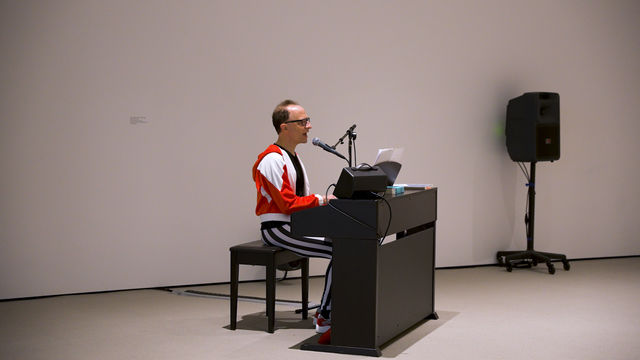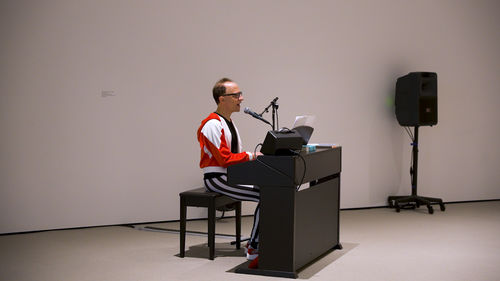
Ultramarine
Daily Schedule
Tuesday–Sunday, April 19–24
- 11:53 a.m.
- 12:53 a.m.
- 1:53 p.m.
- 2:53 p.m.
- 3:53 p.m.
- 4:53 p.m.
- 5:53 p.m.
I will improvise music on a Yamaha digital piano while giving improvised spoken or Sprechstimme renderings of passages from Ultramarine, the third volume of my trance-poem trilogy, published by Nightboat Books in February 2022 .
Some of the musical elements may derive from Haydn, Scarlatti, Chopin, Alexandre Tansman and other composers.
I will chaperone the art objects on display.
I will query the artifacts and atmospheres environing me.
My musical improvisations will respond to people who visit the exhibition.
I will practice in public.
I will do what for me is usually a solitary activity (music-making) in public.
After Warhol’s example, I will be a “living sculpture”: effigy-in-residence.
Why merely visit the exhibition when I can haunt it?
Goal: to exist in a limbo between visibility and invisibility, audibility and inaudibility.
Goal: office hours at the exhibition.
Goal: being at home on an instrument in a place that is not my home.
Goal: improvisatory unprofessional opera.
Goal: divination divagation.
To make myself available for one week in public and to hold a salon while not conversing with guests but merely serenading them and commenting on the liminal performance-space I occupy with embarrassment and bravado. To tease the seam between embarrassment and bravado.
I will put Scarlatti and Haydn and Alexandre Tansman and others to use, apply them to the task at hand.
An experiment in improvisatory pitched speech, approximately pitched speech, accompanied speech, lackadaisical or peppy, walk-in cabaret, no appointment necessary, no dress code, no prerequisites, no insurance.
Treating a public space as a private space, momentarily, for the purposes of refining a musical approach to speech—not to attain “refinement” (polish) but to familiarize myself (in a condition of stress, under the duress of quasi-performance) with handling words and music, improvised music, Ultramarine words, scripted music, improvised words, to assess their friction, their accidental congruities, their appropriateness or inappropriateness for the occasion.
To escape musical and semantic error by intending each accident and salvaging mishap with decisiveness.
Writing-in-public.
A wish to arrive at tentative conclusions about where music and words stand—at what angle to each other—in my body. To find a location for words and music, their uneasy alliance or truculent romance, in my body, in real time, under pressure, in a void, sometimes with no one listening.
Always the void of no one paying attention and then the sudden blast of fickle attention and then the void again: waiting for audience, hiding from audience, avoiding the finitude (the fixity?) of varnish.
An experiment in being unobtrusive while remaining audible and visible and on display.
An experiment in a new conspicuousness, but like tap water’s conspicuousness, not a special concoction, just turn on the tap and I’ll pour out a draught of this mélange.
Ultramarine: trance poems, a diary, composed over a span of three years, and then condensed into epigrammatic clusters, often traveling into other tongues and into surrealism’s contested precincts. A performance, over a period of one week, in public, of the process that led to Ultramarine. Performing the book, in recitative, for whoever drops by. And then putting the book away and attempting other reflections on pressing matters.
Nothing casual or slapdash about the performance. Improvisation doesn’t presuppose carelessness.
A performance that is not a performance and is more like the residue of a performance that never took place. Performance-in-aspic. Performance suspended in translucent ultramarine Jell-O.
Or: spritz perfume sample at a department store. Spritz Sprechstimme for walk-in visitors curious about new sensations. The fragrance is Ultramarine, and it is sometimes diatonic, sometimes atonal, sometimes bitonal, and always haptic, with the throat and mouth and fingers and body working hard as haptic agents while pretending merely to be loafing.
It is easier to write while in the process of fleeing words: fleeing words (fleecing words) while at a Hammer-klavier.
Hammer-klavier Momentary Museum of Sonic Semantic Art for Moonlighters from Workaday Consciousness.
An occasion for new habilements, crossing over my customary (“safe”) brink toward a new zingy embodiment.
Divination-on-the-go.
Sprechstimme Epistles to the No One.
I don’t yet know what it will feel like to be watched and not watched, heard and not heard, at the same time. A customary erasure? An escalation into equilibrium, words and music hitting their exact level in the spirit bubble? And might we call that movement toward equilibrium—toward hitting the spirit bubble’s level—ultramarine?
Opera can take place inside the poem; song can take place inside speech; stillness can take place inside jitteriness and wiggling; ultramarine can take place inside fugue; chromaticism can take place inside declarative sentences.
—Wayne Koestenbaum
Wayne Koestenbaum
Wayne Koestenbaum (b. 1958, San Jose, CA)—poet, critic, novelist, artist, performer—has published twenty-two books, including The Cheerful Scapegoat, Figure It Out, Camp Marmalade, My 1980s & Other Essays, The Anatomy of Harpo Marx, Humiliation, Hotel Theory, Circus, Andy Warhol, Jackie Under My Skin, and The Queen’s Throat (nominated for a National Book Critics Circle Award). His most recent book is Ultramarine, the third volume of his trance trilogy, published by Nightboat Books. In 2020, he received an American Academy of Arts and Letters Award in Literature. Yale’s Beinecke Rare Book and Manuscript Library acquired his literary archive in 2019. His first piano and vocal record, Lounge Act, was released by Ugly Duckling Presse Records in 2017. He is a distinguished professor of English, French, and Comparative Literature at the City University of New York Graduate Center.















